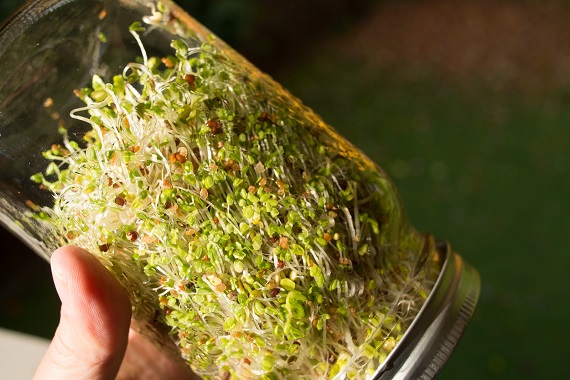


Australia's most comprehensive organic and natural directory
Blog / Food
27 Jul 2017All About Sprouting

Sprouting is very popular within the health and foodie community because sprouts are a great way to boost the nutrition and flavour of any salad or juice. Sprouting is the process of germinating nuts, grains, legumes and seeds which unlocks many beneficial nutrients and enzymes and makes them easier to digest.
Legumes, grains, seeds and nuts have several natural compounds called anti-nutrients which are self-protective and help plants to survive by discouraging animals and insects from eating them and allowing them to pass through the digestive system intact. Lectins are anti-nutrients that disrupt the gastrointestinal lining which may lead to autoimmune issues, leaky gut syndrome, joint pain, skin rashes and upset stomach. Phytic acid is an anti-nutrient which stops minerals like calcium, copper, iron, magnesium and zinc from being absorbed as well as inhibiting digestive enzymes like amylase, trypsin, and pepsin in the body. Tannins are enzyme inhibitors which can cause digestive symptoms and allergic reactions. Soaking and sprouting seeds helps to release and decrease the amounts of these anti-nutrients.
Studies have shown that sprouting seeds increase their amino acid (protein) content and these proteins become easier to digest. It has also been found that sprouts have higher amounts of fibre and a study on sprouted legumes found their levels of antioxidants had increased. This means that their ability to scavenge free radicals and fight cancer and aging is greatly improved.
How to sprout
- Buy raw, organic nuts, seeds, grains and/or legumes that haven’t been prepared in any way.
- Place them in separate bowls and completely cover them with water.
- Soak for about 6-8 hours.
- After soaking, rinse and strain them and place in their own glass sprouting jar.
- Cover the top with some mesh or cheese cloth.
- Leave the jars in a place where they will be exposed to indirect sunlight and air.
- Rinse the seeds twice daily to prevent mould growth.
- Sprouts will be ready to eat in about 2-4 days or when the sprout reaches about 6 millimetres.
- Dry the sprouts and store them in an air tight container in the fridge for about 5 days.
To avoid possible bacterial contamination and mould growth always make sure your work space is clean, wash your hands regularly, make sure the jars are clean and buy nuts/seeds/legumes/grains that are from a reputable source.
Most nuts, seeds, legumes and grains are easy to sprout, however it is not advisable to eat raw sprouted kidney beans as they contain a toxic lectin called phytohaemagglutinin.
Shelled nuts like pecans and walnuts don’t sprout very easily and it’s not easy to sprout flax, chia and hemp seeds because they form a gel-like film when soaked.
Some of the most popular sprouts include mung bean sprouts, alfalfa sprouts, mustard seed sprouts, lentil sprouts, sunflower seed sprouts and broccoli sprouts.
Source








